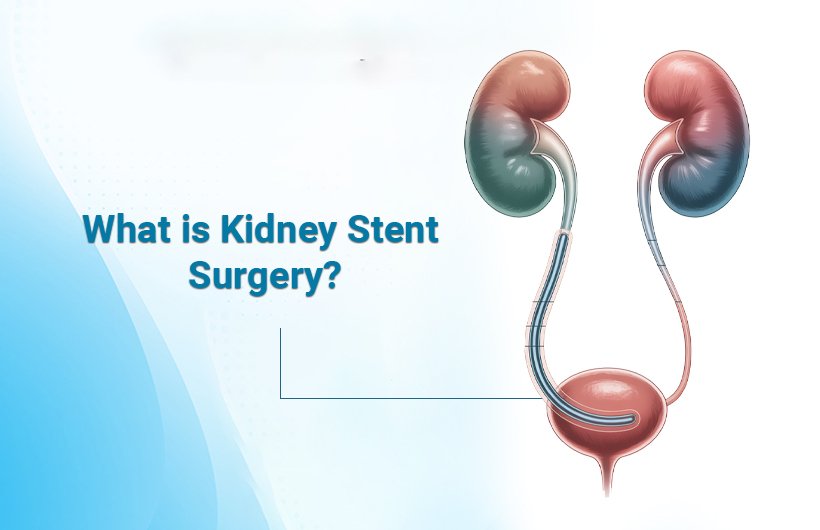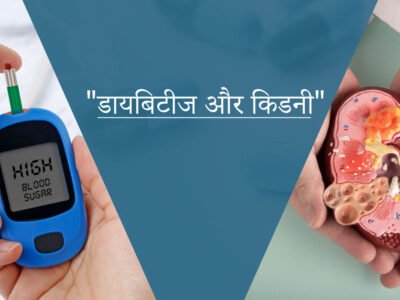Kidney stent surgery is a procedure to help urine flow from the kidneys to the bladder when there’s a blockage. It’s commonly used for people with kidney stones, narrow urinary tracts, or other conditions that stop urine from flowing properly. During the surgery, a small flexible tube called a ureteral stent is inserted into the ureter—the tube connecting the kidney and bladder.
What is a Kidney Stent?
A kidney stent is a small, hollow tube made of soft plastic or silicone. It keeps the ureter open so urine can flow freely. Most stents have coils at both ends to keep them in place.
Purpose of a Kidney Stent:
- Prevents urine blockage in the ureter
- Helps the kidney recover after surgery or infection
- Reduces complications during the treatment of urinary tract problems
When is Kidney Stent Surgery Needed?
Kidney stents are used in various situations, including:
- Kidney Stones: Large stones can block urine flow. A stent keeps the ureter open while the stone passes or is treated.
- Urinary Tract Obstruction: Caused by scarring, inflammation, or tumors pressing on the ureter.
- After Surgery: Temporary stents may help recovery after kidney stone removal or tumor excision.
- Infections and Inflammation: Stents may improve urine flow if infections cause swelling in the ureter.
- Other Conditions: Kidney injuries, congenital narrowing, or cancer treatments may require stenting.
How is a Ureteral Stent Placed?
The procedure is usually quick, taking 15–30 minutes, often as a day-care treatment.
Step-by-Step Process:
- Anaesthesia: Local, spinal, or general anaesthesia is given.
- Cystoscope Insertion: A thin tube with a light is passed through the urethra into the bladder.
- Guidewire Placement: A fine wire is inserted to guide the stent.
- Stent Placement: The stent is placed over the wire, with one end in the kidney and the other in the bladder.
- Position Check: Fluoroscopy or ultrasound ensures correct placement.
- Observation: Patients are monitored until fully awake and then discharged.
Recovery After Kidney Stent Surgery
Most patients recover quickly, though mild discomfort, frequent urination, or light blood in urine may occur.
Recovery Tips:
- First 24–48 hours: Mild pain, burning sensation, or blood in urine may occur
- 1–2 weeks: Body adjusts, and symptoms usually reduce
- Stent Duration: Can stay in for a few days to several weeks
Activity and Diet:
- Avoid heavy lifting, but light walking is encouraged
- Drink 2–3 liters of water daily
- Avoid caffeine and alcohol
- Eat a balanced diet rich in fruits, vegetables, and whole grains
Possible Side Effects and Risks
- Common: Frequent urination, mild belly or kidney pain, slight blood in urine
- Less Common: Infection, stent movement, severe pain, stent blockage
Kidney Stent Removal
Stents are temporary and need removal, usually done in a clinic under local anaesthesia. The process takes about 10 minutes and can sometimes be simpler if the stent has an external string.
Kidney Stent Removal procedure:
- Usually done in a clinic with local anaesthesia.
- A small tool called a cystoscope is used to carefully remove the stent through the urethra.
- The process usually takes less than 10 minutes.
- If the stent has an external string, removal can be even quicker and easier.
Living with a Kidney Stent
Most people can continue normal activities with a stent, but a few adjustments can make it more comfortable and prevent problems.
Managing Discomfort:
- Take pain medicines as prescribed.
- Use a heating pad for back or belly pain.
- Drink plenty of water to reduce irritation.
Watch for Complications:
- Fever or chills (could indicate infection)
- Constant or worsening pain
- Heavy blood in urine
If you notice any of these, see a kidney doctor immediately.
When to Seek Urgent Medical Attention
Call your doctor right away if you experience:
- High fever
- Severe pain in your sides or abdomen
- Heavy or frequent blood in urine
- Difficulty controlling urine or unusual swelling
- Allergic reactions like rash, face swelling, or trouble breathing
Conclusion
A kidney stent helps restore urine flow in case of blockage or injury. It’s a safe and effective temporary solution to protect kidney function. Patients often return to normal activities soon after the procedure. Early medical attention is important if you notice pain, blood in urine, or infections.
Consult Dr. Ravi Bhadania
Dr. Ravi Bhadania is a leading urologist specializing in kidney stent surgery, kidney stones, and advanced urological care. With years of experience and a patient-first approach, he provides accurate diagnosis, minimally invasive treatment, and faster recovery.
Schedule a consultation with Dr. Ravi Bhadania today for personalized care and guidance.


